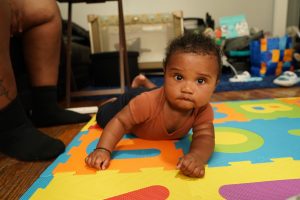By Celia Bernhardt | cbernhardt@queensledger.com
The Brooklyn Downtown Star visited an early voting site in Bedford-Stuyvesant, where a contentious race between Assemblymember Stefani Zinerman and DSA upstart Eon Huntley is playing out. We spoke with passersby about election season and the issues that matter to them.
One 58-year old voter, who preferred to remain anonymous, said she has lived in Bed-Stuy for two years.
Which issues are most important to you when thinking about who to vote for?
“Education and safety. I want to see [you] say what you mean and mean what you say. And unfortunately, I feel like you’ve been in office for four years and you have not said what you meant and meant what you said. So right now, we need a change, and I think Eon’s the change. […] I’ll be two years [in Bed-Stuy] in August, but I’m very active in my community, and I believe in community. And right now I feel like she’s been here for four years and she hasn’t done anything. And the thing is, if Eon doesn’t do his job, we’ll put [him] out and move the next person in! I mean, it’s all about community. Eon to me is a fresh face, and I think he’s what we need right now. Because we need someone who can navigate all people.”

Sheryl Watkins, 76, has lived in the neighborhood for 45 years.
Which issues are most important to you when thinking about who to vote for?
“Safety is important. That is the primary thing.”
What kind of policies do you look for on safety?
“Police presence — fair police presence. And our politicians not to come out just when it’s election time, and then you don’t see them anymore for two years. That’s a big peeve of mine.”
Do you know who you’re voting for in the Assembly election?
“Yes, I do, but I’m not going to say. I voted already — I voted last Sunday. It’s important that people vote. A lot of people died in my generation and older for the ability to vote, and it’s important that we do. And I wish that a lot of young people would vote as well. You know, they don’t like the candidates, a lot of the candidates, but it’s best to vote for someone you like the most out of the two you like the least.”

Around the polling site. Credit: Celia Bernhardt
Tess Johnson, 32, recently moved to the district. She has not yet updated her voting registration, so she’ll be visiting Astoria, where she used to live, to cast her vote.
Which issues are most important to you when thinking about who to vote for?
“Maintaining some resemblance of a democracy — not that we actually really have a complete democracy. Abortion rights and the economy, I guess. […] The education stuff that’s going on here, funding that more. But I haven’t kept up with local stuff.”
Is there any particular reason you haven’t?
“Well, I mean, I guess the biggest thing is just being burnt out from work and life and not putting the energy and effort into changing things. It’s like, keeping up with paying the bills, and I guess it comes down to the economy and inflation being so high. The day-to-day is difficult. But that is not an excuse — I am disappointed in myself right now for not keeping up with them, because these local elections matter the most. So I can’t be, in a way, like complaining about certain things when I’m not doing my due diligence right now.”

Gabi Farley. Credit: Celia Bernhardt
Gabi Farley, 24, moved to the neighborhood one year ago. She is not registered to vote in the district, and so has not been keeping up with the election.
What would be important to you if you were choosing who to vote for in a State Assembly election?
“Definitely education and housing. I’m a preschool teacher, so education is really important to me — I teach preschool in DUMBO. […] But in general, I think education is really important. Housing and healthcare are really important to me.”
Are there any policy issues with education that are on your mind?
“I think the arts and education. I think arts are really important, and I think that anybody trying to cut funding for the arts is not for me. Children need art, it’s a really good way for them to express themselves.”

One 50-year-old campaign staffer handing out palm cards for Assemblymember Zinerman, who preferred to remain anonymous, said he has lived in the neighborhood his whole life.
What made you get involved with the campaign?
“I like that I get to get out and interact with other people and try to convince them to vote for the right candidate.”
Why is Zinerman the right candidate?
“It’s a few things. I don’t know how weird this sounds, but I trust her. That’s kind of a hard thing to do — put your trust in people. I trust her to do the right thing.”
What makes you trust her?
“Well, normally, I get a bad vibe, and I haven’t gotten any bad vibes from here. And I gotta say, you know, it’s hope [that] somebody can do something and change the way things are around here.”
What needs to change?
“Police harassing people for no reason — things like that. [I want to] be able to come outside and not worry about too much of anything happening wrong.”





















